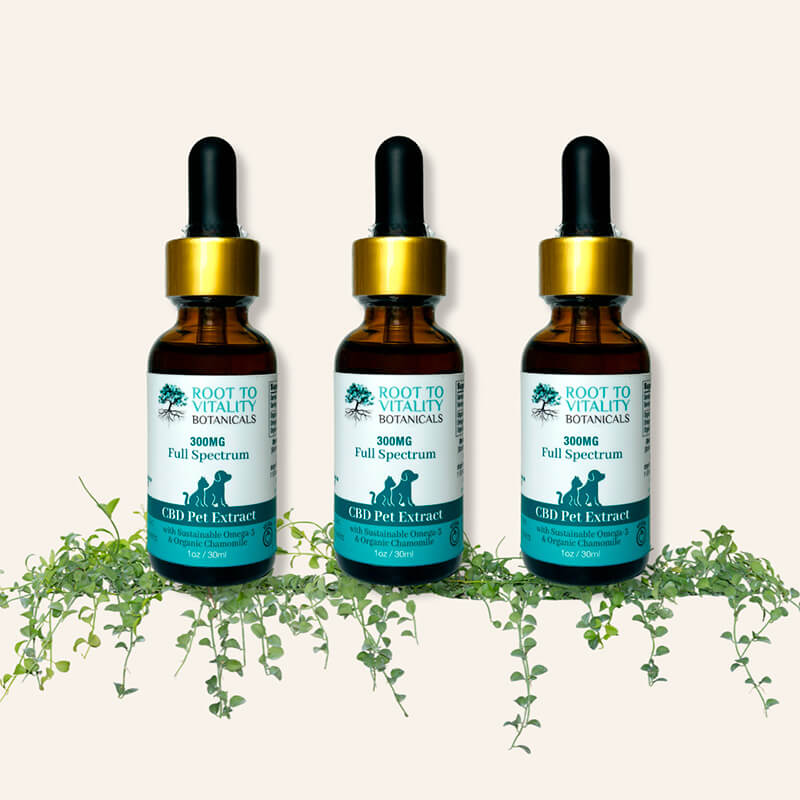Despite their furry four-legged appearance, our pets have a lot in common with us as humans, on both a physical and mental level. With these similarities can come a multitude of daily ailments. Fortunately the healing powers of Full Spectrum CBD, the chemical compound found in hemp and cannabis, can help our furry friends just like CBD helps us. To really understand how one herb can help with so many different health ailments, we first need to understand the Endocannabinoid System, also referred to as the endogenous cannabinoid system and ECS.
We are so grateful Root To Vitality has given us the platform to help share the healing power of herbs and botanicals for our canine and feline friends. Before we dive in, you may be wondering what inspired us to combine Full Spectrum CBD drops with Omega-3 and Organic Chamomile for our pets. The answer is Mike! Our dog Mike, who is a mix of lab and German Shepard, inspired us. Mike joined our family in 2016 at the age of 6. Despite Mike’s difficult upbringing and health challenges he is one of the kindest pets, filled with so much love for human and animal friends of all ages. We have always admired his continuous excitement and thrill for life despite all odds.
After adding Full Spectrum CBD into my daily regimen and experiencing great improvements with my autoimmune condition, we were excited to try administering the herb to Mike. Our excitement was due to learning how almost all animals including mammals, birds, reptiles, and fish have an ECS too. Below we will cover research on one of the most important physiologic system involved in establishing and maintaining health: how Full Spectrum CBD can help to support the ECS, the therapeutic potential of hemp and cannabis, how to calculate the best dose for your pet, and tips on how to help enhance the effectiveness of CBD.
The Endocannabinoid System (ECS)
The Endocannabinoid System (ECS) is comprised of endogenous cannabinoids (derived from within us and animals), their receptors, and metabolic enzymes that play a critical role in establishing homeostasis. Homeostasis means the maintenance of a stable internal environment despite fluctuations in the external environment. This incredible system known as “the most important physiologic system involved in establishing health” (Dr. Sulak “The Endocannabinoid System” 1) mediates a homeostatic balance of the nervous and immune system in addition to other organ systems, like the lungs, liver, and intestines. "Research suggests that a balanced ECS promotes appetite, sleep, mood regulation and stability, gait, pain perception, memory, body temperature, immunity, reproduction and fertility in both humans and pets” (Dr.Varadharaj 1). When the ECS is out of balance due to lack of enough endocannabinoids, which can be caused by environmental factors for example, many physical signs are observed in dogs such as digestive issues (irregular bowls, diarrhea, vomiting), poor appetite, pain and inflammation, sleep issues, stress, lethargy and lack of activity, poor balance and coordination, and anxiety / fear and aggression. Supplementing the ECS with Phytocannabinoids (plant derived cannabinoids from hemp and / or cannabis) has been shown to ignite the same physiological effects as our own endocannabinoids, promoting systemic vitality and wellbeing.
Terminology Breakdown
-
Endocannabinoids - Chemical compounds that are naturally produced within the body.
-
Phytocannabinoids - Plant based chemical compounds found in hemp and cannabis.
Anandamide (AEA) and 2-arachidonoylglyerol (2-AG) are two types of endocannabinoids that are produced from lipids (fats) in the body.
-
Cannabinoid receptor 1 known as CB1.
-
Cannabinoid receptor 2 known as CB2.
CB1 is the most abundant protein-bound receptor in the Central Nervous System (CNS). CB1 receptors are also found in a variety of other tissues, including fat cells, liver cells, gastrointestinal tract, peripheral nerves, musculoskeletal tissues, immune cells, and the reproductive tract. “The ubiquitousness of CB1 throughout the body provides insight into how vital the ECS is to the body’s functions. CB1 exerts inhibitory action on a wide variety of neurotransmission systems. As a result, CB1 receptors affect mood, cognitive, pain and inflammation, appetite, and nausea” (Dr. Richter 4).
Next up on the list is CB2 receptors! CB2 receptors are found mostly in the immune system, as well as in tissues and organs throughout the body. “They are frequently expressed on T and B lymphocytes and macrophages as well as on cells of the spleen, liver, kidneys, and skin. CB2 receptors function, not surprisingly, in immune modulation and mediation of inflammation” (Dr. Richter 4). Although CB1 and CB2 receptors are the most studied, scientists are continuing to discover various other receptors that also interact with endogenous cannabinoids (endocannabinoids) and, by association, exogenous cannabinoids (phytocannabinoids).
-
Fatty acid amide hydrolase (FAAH) that breaks down AEA
-
Monoacylglycerol acid lipase (MGL) that normally breaks down 2-AG
Animal verse Human
"Cannabis has been used in veterinary medicine for nearly as long as humans have used it to treat common health issues. Thousands of years ago, the ancient Greeks used cannabis to treat horses for colic, inflammation, and even to health battle wounds" (Dr. Richter "CBD: A Patient’s Guide To Medicinal Cannabis" 183).
The animal and human Endocannabinoid System are very similar in regards to the cellular processes and organ systems. The main difference boils down to the concentration of CB1 receptors in dogs compared to humans. Studies have shown a much higher amount of CB1 receptors in the hindbrain structures (cerebellum, brain stem, and medulla oblongata) of canine species in comparison to humans. These structures within the brain regulates heart rate, breathing and muscle coordination. The greater density of CB1 receptors in canine brains causes dogs to be more sensitive to THC, the psychoactive phytocannabinoid found in cannabis. We must be cautious when using cannabis sourced products to treat our pets, as ingesting too much THC can cause very unpleasant side effects.
The Full Spectrum CBD sourced for Root To Vitality’s CBD pet extract is sourced from industrial hemp, which means there is only the legal amount of 0.3% or less THC. This minute amount helps to enhance the effectiveness of all the other plant constituents found within hemp, including the other cannabinoids and terpenes. Using hemp sourced CBD products does not pose the threat of overdose for dogs due to the low THC content. Full Spectrum CBD, the most beneficial type of CBD, contains only trace amounts of THC, which is not enough to trigger a psychoactive effect.
Mike's Story

As previously mentioned at the beginning of the article, our dog Mike endured plenty of hardships before he joined our family at the age of 6. We believe these hardships are the root cause to a lot of his health ailments. With that being said, we are so grateful for the healing power of food as medicine, supplements, and botanicals, as they have all played a vital role in helping to increase his vitality. When we first welcomed Mike to our family he was suffering from a condition known as drop jaw. This is where the lower jaw hangs open and the animal is unable to close their mouth due to paralysis of the jaw muscles. At this same time, he started to experience muscle loss on both the left and right side of his head. After we explored conventional treatments with no signs of relief (including steroid treatment) we looked to holistic options. We are delighted to share with a combination of acupuncture, supplements (including a muscle skeletal support remedy) and dietary adjustments, Mike was relieved of drop jaw and muscle loss.
Fast forward 3 years later, Mike suddenly developed a neurological condition where he was unable to fully blink and close his eyes, facial paralysis, and vestibular neuropathy. Vestibular neuropathy causes extreme dizziness in dogs where they are unable to walk straight and fall over. Thankfully a combination of an antibiotic administered via a syringe and a couple different Chinese herbal formulas helped Mike to regain his balance and restore his eye function. If your dog suffers from a sensitive digestive track, ask your veterinarian if an antibiotic administered via a syringe is an option. This type of administration is much more gentle on their digestive system than antibiotics taken orally. We have since formulated and added Full Spectrum CBD into Mike’s regimen, which has also helped him improve his overall quality of life. He is able to move around with more ease, less stiffness, and increased mobility! We are happy to report he is lifting his leg again (quite high if we may add) when he goes #1.
We hope Mike’s story inspires other pet parents to not give up! All of the remedies animals need to thrive, nature truly provides.
Endocannabinoid Functions
“A balanced ECS plays an important role in regulating the neurological, endocrine, musculoskeletal and immune systems through a complex cellular network to ameliorate pain and inflammation, modulate metabolism, support bone health, and promote digestive health” (Dr. Varadharaj 4).
-
Sleep
-
Memory
-
Gut function & response
-
Metabolic processes
-
Stress response
-
Relaxation
-
Resiliency
-
Healthy inflammation response
Dosing Recommendations
The proper dose of Full Spectrum CBD used to enhance our dogs and cats Endocannabinoid System can depend on our pets size, the condition being helped, and their metabolic rate.
As a general rule of thumb we recommended 0.25mg of CBD per 1 pound of bodyweight.
Body weight X 0.25mg = Recommended dose
For example, if you wanted to administer your 80 lb dog a regular dose, you would multiply his body weight by 0.25mg which equals 20mg of CBD ((80 lb X 0.25mg = 20mg)).
Regardless of the calculated dose, we always recommend starting with a low dose and slowly working up to the calculated dose, as each pet metabolizes supplements differently and may not require as high of a dose.
Not seeing results? Continue below to learn how to increase the effectiveness of your pet's CBD regimen.

Did you know essential fatty acids can naturally help the endocannabinoid system function optimally and enhance the effectiveness of medicinal hemp? That is why we added Omega-3 to our Full Spectrum CBD pet extract. Precursors of endocannabinoids, omega-3 fatty acids are required for a healthy ECS. “Studies have also shown that omega-3 deficiency creates dysfunctional endocannabinoid receptors, uncoupling them from the protein and altering signaling pathways in the brain” (Dr. Martinsen 3). This means if your pet is deficient in Omega-3, most likely their endocannabinoid receptors are dysfunctional. This means no matter how many cannabinoids you supplement your dog or cat with, they may not experience the benefits you were hoping for them to achieve. Not only can Omega-3 supplementation help to improve the effectiveness of Full Spectrum CBD, but Omega-3 has a lot of benefits in-and-of itself.
Benefits of Omega-3
-
Supports healthy skin and coat
-
Improved brain health. Widely known as a “brain food” Omega-3 has been proven to help puppies pick up new skills. “In one study cited by the American Kennel Club (AKC), puppies provided with DHA (a property of Omega-3) were able to learn new skills faster than those that were not” (Dr. Alleyne 2).
-
Reduced inflammation and joint pain
-
Prevent cardiovascular issues
-
Helps to mitigate both environmental and seasonal allergies
Last but not least, we also added Organic Chamomile to our pet formula.
Chamomile Infusion

Chamomile and CBD are both very gentle herbs that have been shown to calm nervousness, ease discomfort, and support our pets digestive system.
“There is some anecdotal evidence that chamomile may help treat anxiety, gastrointestinal issues, and skin conditions, among other health issues” states Dr. Huzzah, a Los Angeles-based veterinarian specializing in oncology and complementary and alternative medicine.
This new combination of herbs, Full Spectrum CBD combined with Omega-3 and Organic Chamomile, will work synergistically to provide more support than what CBD alone can offer.
To learn more about our 300MG Full Spectrum CBD Pet Extract - Click Here.
Special Reminder
Our canine and feline friends' bodies, as well as their cell metabolism are extremely complex and dependent upon the interactions of varies factors including genes, environment, nutrition, microbiome, age, gender, etc. As we often state here at Root To Vitality - “Every new discovery will take you a step closer to reclaiming your health”. When we understand the underlying mechanisms of the body and the root cause, we can then start to apply a synergy of wholesome efforts to help restore vitality again for our furry friends.
To good health,
Founder - Bridget Hoppe
Author, Guest. “How Does CBD Affect a Dog's Endocannabinoid System?” Canine Journal, 21 Mar. 2022, https://www.caninejournal.com/cbd-dogs-endocannabinoid-system/.
“Benefits of Omega-3 for Dogs.” Betterpet, 19 Nov. 2021, https://betterpet.com/omega-3-for-dogs/.
Leinow, Leonard, et al. CBD: A Patient's Guide to Medicinal Cannabis. North Atlantic Books, 2017.
